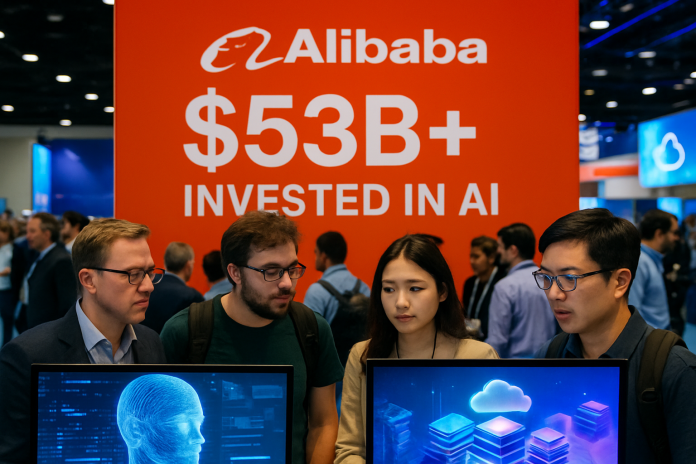Quick Take
- Alibaba exceeds $53 billion AI investment commitment, strengthening global competitive position
- CEO projects $4 trillion in worldwide AI investments over next five years
- New data centers launching in Brazil, France, Netherlands to support international expansion
- Stock reaches four-year high following strategic AI pivot announcement
Chinese tech giant accelerates artificial intelligence spending amid intensifying rivalry with US counterparts | Stock surge follows investment expansion
Alibaba Group Holding Ltd. has pushed its artificial intelligence investment budget beyond the initial $53 billion commitment, marking a decisive shift from consumer-focused commerce to AI infrastructure leadership. The announcement came at Alibaba’s annual cloud technology summit, signaling the company’s determination to compete directly with global tech giants despite mounting geopolitical pressures.
CEO Eddie Wu projects that global AI investments will reach $4 trillion over the next five years, positioning Alibaba’s expanded commitment as a strategic move to capture significant market share during this unprecedented spending cycle.
Strategic Infrastructure Expansion Drives Global Reach
The investment surge supports Alibaba’s ambitious international expansion, with new data centers planned for Brazil, France, and the Netherlands. These facilities will deliver low-latency AI services to regional markets, addressing growing demand for localized artificial intelligence capabilities.
Alibaba’s approach centers on controlling the complete AI technology stack, from custom chips to cloud infrastructure. This vertical integration strategy aligns with China’s broader push for technological self-sufficiency, particularly as access to advanced semiconductors faces increasing restrictions.
Hybrid Technology Strategy Navigates Geopolitical Challenges
Despite limited access to cutting-edge processors like Nvidia’s latest chips, Alibaba has developed a hybrid approach that combines proprietary technologies with available international components. The company’s new Qwen3-Max large language model exemplifies this strategy, showcasing domestically developed capabilities that can compete with Western alternatives.
This technological pragmatism allows Alibaba to maintain competitive performance while reducing dependence on foreign suppliers. It’s a critical advantage as trade tensions continue to reshape global technology supply chains.
Market Validation Reflects Investor Confidence
Alibaba’s AI-focused transformation has generated substantial market enthusiasm, driving stock prices to a four-year high. The positive investor response validates the company’s strategic pivot and demonstrates confidence in its ability to execute large-scale infrastructure investments effectively.
The stock surge reflects broader market recognition that Alibaba’s AI commitment positions the company advantageously in what analysts expect to be a multi-trillion-dollar global market expansion over the coming decade.
Competitive Positioning in Global AI Landscape
Alibaba’s increased spending places the company among the world’s most aggressive AI investors, directly challenging US technology leaders who have traditionally dominated artificial intelligence development and deployment. The scale of investment demonstrates China’s commitment to achieving technological parity in critical emerging sectors.
The expansion strategy extends beyond pure financial commitment. It encompasses talent acquisition, research partnerships, and strategic alliances designed to accelerate AI capability development across multiple verticals including cloud computing, autonomous systems, and enterprise software.
As global AI competition intensifies, Alibaba’s expanded investment commitment represents both a significant financial bet and a strategic necessity for maintaining relevance in rapidly evolving technology markets where leadership positions can shift dramatically based on infrastructure capabilities and innovation speed.






